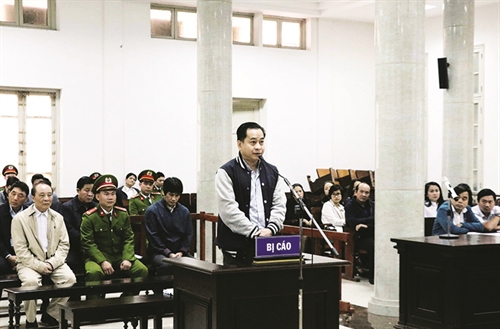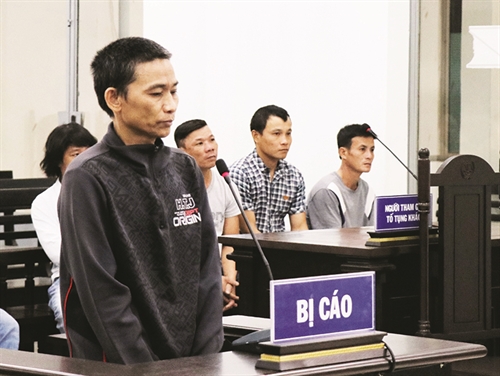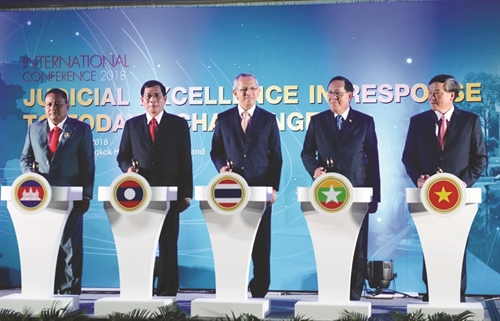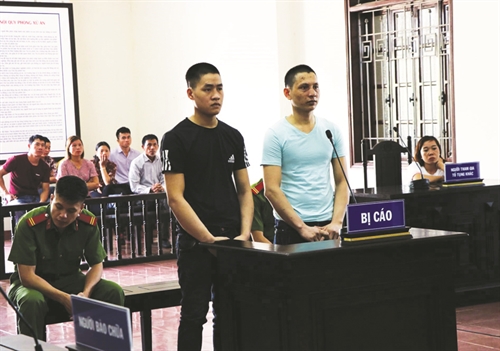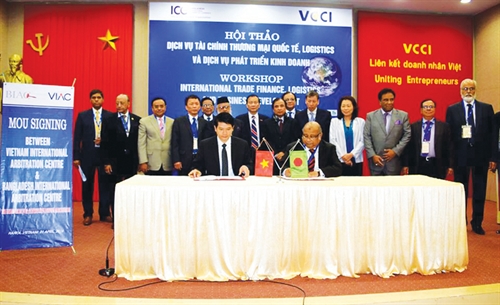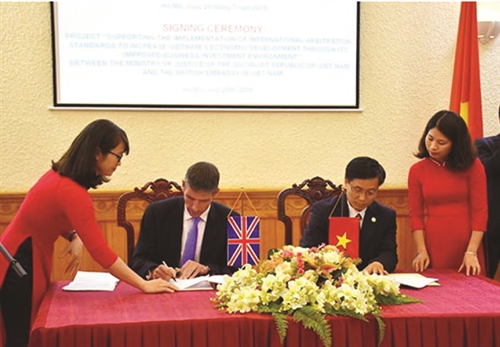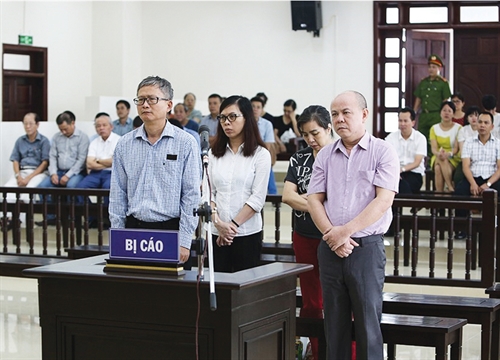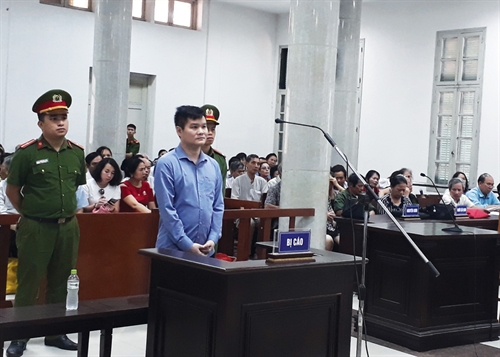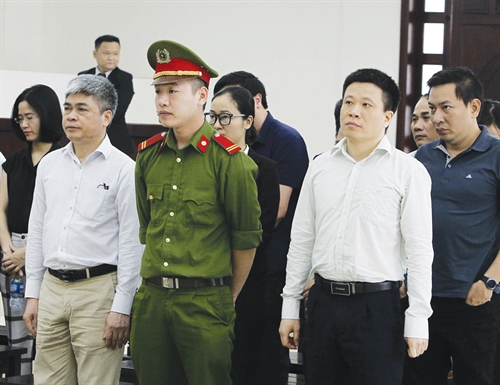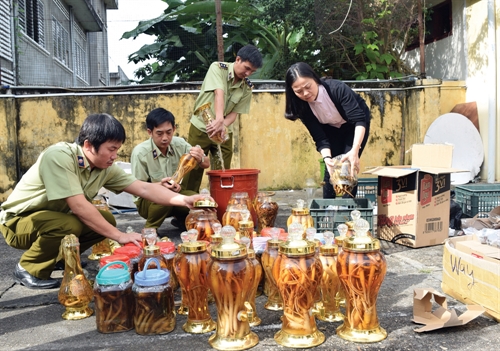Le Huynh Tan Duy[1]
Lecturer, Ho Chi Minh City University of Law
Legal aid and its characteristics and role in criminal justice
Under the 2017 Law on Legal Aid[2] (the Law), legal aid is defined as the provision of pro-bono legal services to legal aid beneficiaries in legal aid cases or matters, contributing to guaranteeing citizens’ right of access to justice and equality before law. As compared to the 2006 Law on Legal Aid (the 2006 Law), this provision no longer mentions objectives of legal aid activities such as improving legal knowledge and sense of law observance and contributing to law dissemination and popularization and violation prevention and control. This aims at shifting focus on helping beneficiaries in legal proceedings, securing justice and more effectively protecting their lawful rights and interests.
As per the Law and the 2006 Law as well as the United Nations’ criminal justice regulations, legal aid in criminal proceedings has the following characteristics:
First, since criminal proceedings are carried out by competent state bodies to verify facts of criminal cases, prove offenses and criminally charge offenders, they might easily impact or infringe upon human rights and basic rights of citizens. Therefore, legal aid providers in criminal proceedings, particularly defense counsels, must be those who are deeply knowledgeable about penal and criminal procedure laws and have good adversarial process skills.
Second, legal aid in criminal proceedings may be provided in various interrelated forms such as legal counseling, assistance and representation. The most appropriate form will be decided for each specific procedural stage. For example, counseling is usually provided during the initiation of criminal cases, investigation and prosecution, while assistance and representation are mainly provided during court proceedings, especially at hearings.
Third, legal aid in criminal proceedings is provided free of charge (pro-bono) to certain groups of proceeding participants, including criminally charged persons, victims and witnesses, who satisfy such conditions as having financial difficulties and being disadvantaged persons (children, persons with disabilities, the elderly). Remunerations for pro-bono legal aid providers are paid by the State.
Fourth, legal aid in criminal proceedings is provided for multiple purposes. In addition to helping proceeding participants protect their lawful rights and interests, legal aid providers perform law dissemination and education work and facilitate access to legal information and restorative justice process. Besides, legal aid plays an important role in facilitating diversion and the use of communitybased sanctions and measures, including noncustodial measures, promoting greater community involvement in the criminal justice system, reducing unnecessary detention and imprisonment, rationalizing criminal justice policies, and ensuring efficient use of the State’s resources[3].
Regarding the role of legal aid in criminal justice, it is an essential element of a fair, humane and effective criminal justice system that is based on the rule of law. Legal aid is a foundation for the enjoyment of other rights, including the right to a fair trial, a precondition to exercising such rights and an important safeguard that ensures fairness and public trust in the criminal justice process[4]. Analyzing this description, we can understand the important role of legal aid in criminal justice as follows:
First, legal aid is an essential element of a fair, humane and efficient criminal justice system. One of the requirements on fair criminal proceedings is that proceeding participants with the same status must enjoy same rights and perform same obligations. In fact, due to such reasons as financial difficulties, vulnerability and physical and mental impairments, some persons are unable to exercise their procedural rights and have to rely on others to protect their law rights and obligations. The State is obliged to arrange pro-bono legal aid for these persons in order to ensure fairness and humanity of criminal justice. Besides, legal aid greatly contributes to the efficiency of criminal justice by reducing the length of time suspects are held in custody and detention centers, in addition to reducing the prison population, wrongful convictions, congestion in the courts, and reoffending and revictimization[5].
Second, legal aid contributes to the exercise of other procedural rights provided by the criminal procedure law, including the right to defense, the right to protection of lawful rights and interests, the right to adversarial argument and especially the right to fair trial which is a very important human right enshrined in the 1948 Universal Declaration of Human Rights and the 1966 International Covenant on Civil and Political Rights. The right to fair trial and the right to equality before courts and tribunals[6] constitute a procedural means to guarantee the rule of law. To properly exercise the right to fair trial, adversarial parties, especially criminally charged parties, must have same conditions and opportunities in collecting and using evidences for the adversarial process at hearings; with counseling and assistance by legal aid providers, these activities can be carried out in a more thorough and efficient manner.
Third, legal aid consolidates people’s trust in law and justice because legal aid activities help courts make fair and lawful judgments and avoid injustice, and help people, particularly legal aid beneficiaries, understand the humanity of the criminal procedure law and the role of the State in ensuring the practical exercise of human rights and citizens’ rights in criminal proceedings.
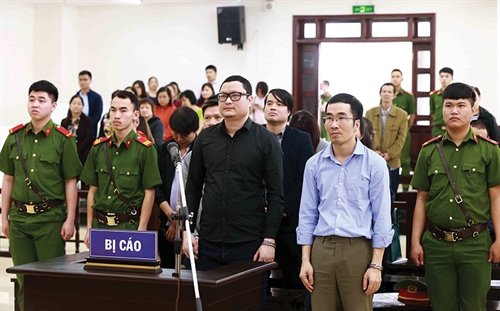 |
| Defendant Tran Huu Tiep (in black) and his accomplices at the first-instance trial held in Hanoi on April 4__Photo: Doan Tan/VNA |
Legal aid beneficiaries in criminal proceedings
Article 7 of the Law specifies fourteen groups of legal aid beneficiaries, including some special groups of criminally charged persons who are aged between full 16 years and under 18 years, criminally charged persons who are members of households living just above the poverty line, victims in criminal cases who are aged between full 16 years and under 18 years and have financial difficulties. Compared to the 2006 Law with only six groups, the Law fully covers the disadvantaged groups as governed by relevant laws.
To receive legal aid, a criminally charged person is required to satisfy either of the age and financial status conditions, while a victim must satisfy both conditions. This is because the former is more vulnerable to infringement upon basic rights and human rights during the settlement of criminal cases.
Both the 2006 Law and the Law do not treat witnesses as a group of legal aid beneficiaries albeit the United Nations Principles and Guidelines on Access to Legal Aid in Criminal Justice Systems recommend that states (countries) should, where appropriate, provide legal aid to witnesses[7].
Legal aid providers in criminal proceedings
Though the Law specifies various legal aid providers, including legal aid officers, lawyers, legal counselors and legal aid collaborators[8], it allows only legal aid officers and lawyers to participate in legal proceedings[9], including criminal proceedings, probably because legal aid providers in legal proceedings must be those who are profoundly knowledgeable about procedure law and have adversarial argument skills and experience.
A legal aid officer must be a public employee of a state legal aid center and fully meets the criteria prescribed in Article 19 of the Law and appointed and granted a legal aid officer card at the request of a provincial-level Justice Department director[10]. In addition to the criteria of good ethical qualities, professional qualifications and health, he must have been trained in lawyer profession or be exempted from lawyer training and have undergone law practice or legal aid probation and must not currently subject to any form of discipline[11]. These criteria are stricter than those prescribed in the 2006 Law, aiming to raise the quality of legal aid as well as counseling services.
Legal aid officers and lawyers may participate in criminal proceedings as defense counsels or defenders of lawful rights and interests of legal aid beneficiaries. As defense counsels, they defend criminally charged persons (arrestees, persons held in custody, the accused or defendants)[12]. As defenders of lawful rights and interests, they defend victims and other involved parties in criminal cases (civil plaintiffs, civil respondents, persons with related interests and obligations)[13], denounced persons or persons against whom criminal case initiation is proposed. Notably, the 2015 Criminal Procedure Code allows legal aid officers to participate in criminal proceedings as defenders of lawful rights and interests of denounced persons, persons against whom criminal case initiation is proposed, victims or other involved parties regardless of whether these persons are entitled to legal aid or not, but does not specify papers to be presented by legal aid officers or lawyers when wishing to participate in proceedings to defend such persons.
A criminally charged person aged between full 16 and under 18 years or an accused or a defendant from a poor family who is prosecuted or tried for an offense punishable by 20 years in prison, life imprisonment or death and has both rights to receive legal aid and to appointed defense may choose to enjoy which right in legal proceedings. If he opts for the right to receive legal aid, the proceeding-conducting body will request a state legal aid center to appoint a legal aid officer or lawyer to defend him.
Legal aid activities at different proceeding stages
Compared to other forms of legal aid (legal counseling and representation beyond proceedings), legal aid in the form of defense in legal proceedings is not provided too often, mainly in criminal cases involving criminally charged minors.
At the stage of criminal case initiation
As stipulated by the 2015 Criminal Procedure Code, at this stage, denounced persons, persons against whom criminal case initiation is proposed, persons held in case of emergency, arrestees and persons held in custody may defend themselves or ask other persons to defend their lawful rights and interests (a form of legal aid). Meanwhile, it is provided in the Law that only when facing a criminal charge, can persons receive legal aid. Obviously, the range of legal aid beneficiaries at this stage under the Law is narrower than that provided in the 2015 Criminal Procedure Code. In fact, the right to receive legal aid before a criminal case is initiated and investigation in carried out can hardly be exercised. In some practical cases, proceeding-conducting bodies even failed to appoint defense counsels for criminally charged minors as required in Joint Circular 01/2011/TTLT-VKSNDTC-TANDTC-BCA-BTP-BLDTBXH dated July 12, 2011.
Specific legal aid activities at this stage are not mentioned in the Law but are indirectly expressed through the rights and obligations of defenders of lawful rights and obligations of denounced persons or persons against whom criminal case initiation is proposed[14]. These activities can be divided into the following groups:
First, evidence-related activities, including provision of evidences, documents, objects and claims; examination and evaluation of, and presentation of opinions on, such evidences, documents and objects and request competent persons to do so.
Second, psychological assistance for legal aid beneficiaries, including appearance when their statements are taken, giving of questions to them after the taking of statements and appearance during their confrontation, identification or voice recognition.
Third, activities to help detect and remedy errors of proceeding-conducting bodies and persons, including also making complaints about decisions and acts of these bodies and persons.
At the stage of investigation and prosecution
At this stage, legal aid activities of defense counsels for the accused are mainly for counseling and adversarial argument purposes. Defense counsels are obliged to use any law-prescribed measures to clarify circumstances that can prove the accused innocent or extenuate their penal liability and at the same time render legal assistance to protect their lawful rights and interests. At this stage, they have more rights[15] or can carry out more legal aid activities than at the stage of criminal case initiation as investigators or procurators also carry out more procedural activities to collect evidences against the accused.
At the stage of trial
Legal aid activities of defense counsels for the accused (during the preparation for first-instance trial) and defendants (at first-instance hearings) are entirely for the adversarial process purpose. Defense counsels have the rights to participate in giving questions and making arguments at hearings, make complaints about procedural decisions and acts of proceeding-conducting bodies and persons, appeal against court judgments and rulings in case defendants are under 18 years old or with physical or mental disabilities. Defenders of lawful rights and interests of victims and other involved parties have rights similar to those of defense counsels at this stage.
Legal aid for persons held in custody and detainees
Persons held in custody and detainees[16] are those temporarily isolated from the society or those, after criminal proceedings, having difficulties defending their lawful rights and interests and therefore entitled to legal aid. The Law prohibits acts of intimidating, obstructing or illegally intervening into legal aid activities and provides rights of persons held in custody and detainees to be provided with instructions, explanations and guarantee (by custody and detention facilities) for their access to legal aid[17]. These rights are quite necessary since these persons are unable to send legal aid requests directly to legal aid centers and can only do so via custody or detention facilities[18].
Recommendations
First, the Law should add two groups of legal aid beneficiaries: denounced persons, persons against whom criminal case initiation is proposed, criminally charged persons, judgment debtors and persons subject to judicial measures who are aged between full 16 and under 18 years and members of families living just above the poverty line.
Second, in order to become in tune with the Law, the 2015 Criminal Procedure Code should provide that defenders of lawful rights and interests of denounced persons, persons against whom criminal case initiation is proposed, victims and other involved parties may act as legal aid officers in case these persons are entitled to legal aid.
Third, the 2015 Criminal Procedure Code should add procedures which are similar to those for defense counsel registration[19], for registering participation in criminal proceedings of lawyers and legal aid officers as defenders of lawful rights and interests of denounced persons, persons against whom criminal case initiation is proposed, victims and other involved parties.
Fourth, a criminally charged person who is entitled to an appointed defense counsel and concurrently to legal aid should be allowed to decide to choose either of these.
Fifth, legal aid should be provided to victims in criminal cases where necessary. As recommended by the United Nations, circumstances in which it may be appropriate to provide legal aid to witnesses include situations in which: (a) the witness is at risk of incriminating himself or herself; (b) there is a risk to the safety and wellbeing of the witness resulting from his or her status as such; and (c) the witness is particularly vulnerable, including as a result of having special needs[20].-
